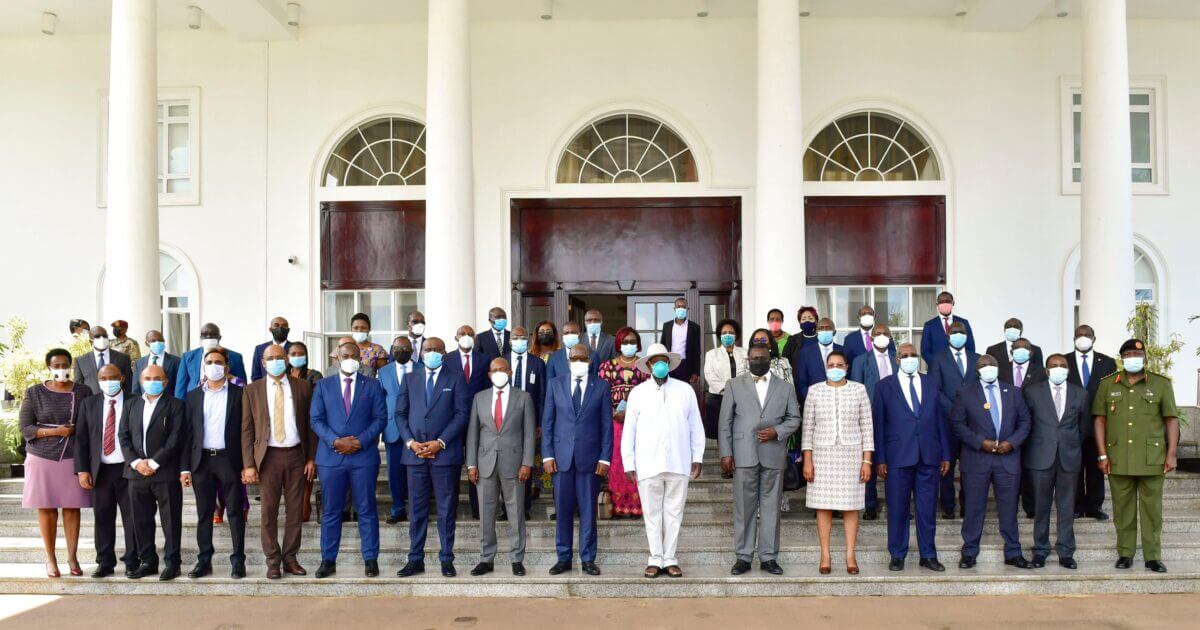
Our Projects are
Transforming African Trade
Quick Contacts
2nd Floor, Fidelity Insurance Centre Waiyaki Way, Westlands

President Museveni and other officials in a group photo after signing the Inter-Governmental Agreement (IGA) concerning the joint implementation of the road infrastructure on the territory of the Democratic Republic of Congo/State House Photo
Uganda and the Democratic Republic of Congo-DRC have signed major agreements that will see the two countries bolster cross border trade, development and the stabilization of Eastern Congo.
The signing ceremony that was held on Thursday at State House Entebbe, is a follow up to the meeting between President Yoweri Museveni and President Felix Tshisekedi that recently took place at State House Entebbe when he was in the country to attend the swearing ceremony of President Museveni.
President Yoweri Museveni signed an inter-governmental agreement on behalf of Uganda while the Democratic Republic of Congo Deputy Prime Minister and Minister of Foreign Affairs Christophe Lutundula signed on behalf of the Democratic Republic of Congo.
The signing was witnessed by the new Speaker of Parliament Rt. Hon. Jacob Oulanyah.
On the same occasion, a Project Development Agreement was signed between the two countries on cross-border roads. The Permanent Secretary Ministry of Works and Transport Bageya Waiswa signed on behalf of Uganda while the DRC Minister of State for Infrastructure and Public Works Alexi Gisaro Muvunyi signed on behalf of the Democratic Republic of Congo.
This was witnessed by the new deputy Speaker Anita Annet Among. The third PDA agreement was signed with the Dott Services Contractors and witnessed by DR Congo’s Presidential Advisor Bisere Fortunate.
Speaking shortly after the signing ceremony, Museveni expressed gratitude to President Tshisekedi and the DRC government for accepting to partner with the Uganda government in the three crucial sectors of roads, electricity and security that he said are the pillars of development to any nation.
“This is just butter on a bread roll. Peace is the bread and roads are the butter. It’s good that President Tshisekedi sent his team to do something about the roads. We are also ready for the electricity. We took power to Kasindi and now Beni and Butembo. We shall extend to Mahangi. We are ready to work on three things, security, roads and electricity. Even if we don’t do anything else, for now, people on both sides will be happy with these,” said Museveni.
Breaking with protocol, President Museveni said a new government has not yet been appointed into place because they need parliament to sit and vet the appointees that is why he had to sign the agreements witnessed by the Speaker and Deputy Speaker. Former Ministers including Sam Kutesa who was invited as MC, Gen. Katumba Wamala and former Attorney General William Byaruhanga were invited as guests.
“We have not constituted government now. There are only three people, the President, Speaker and Deputy Speaker. There are no ministers. I will sign with the Deputy Prime Minister,” he said.
Museveni said Uganda and DR Congo not only share borders but their people are the same. “The Nandis in Congo, the Bakonjo, Banyoro, Bahema, Banyamboga, Bamba, Hutu, Lendu etc are the same people. When there is insecurity, we are affected directly. We currently have 4,000 Congolese refugees in Uganda camps and others in society with their relatives,” he said.
For his part, Christophe Lutundula who delivered a special message from Tshisekedi said he trusts Museveni in the three areas of roads, electricity and security and believes that once implemented, the needs of the people will be met. “His commitment to these projects is true and firm. We shall implement what is going to be signed today and we believe and are convinced that they will be appreciated and will be of great benefit to the people both current and future generations,” he said.
He added that Tshisekedi was happy with Museveni’s Pan-African stand that emphasizes Africans finding solutions for their problems.
Read original article
Disclaimer: The views and opinions expressed in this article are those of the authors and do not necessarily reflect the official policy or position of TradeMark Africa.